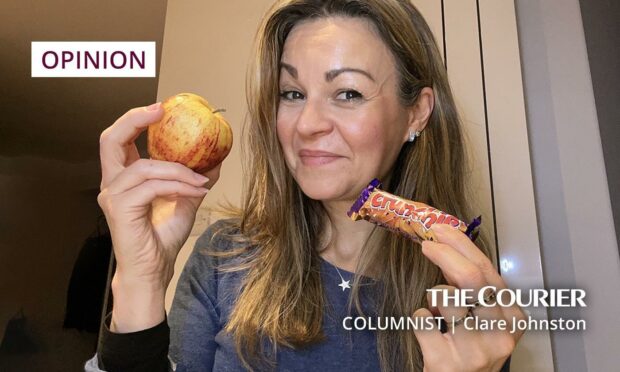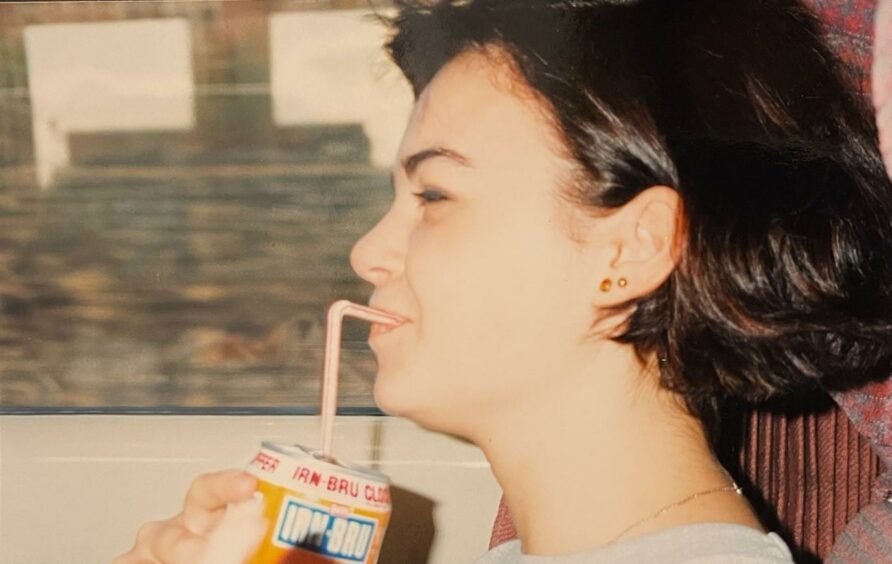It had been four months since I’d last seen my grandfather, and as I stood waiting for him to walk through the arrival gates of JFK airport I wondered what his reaction would be.
It didn’t take me long to find out.
Within five seconds of clapping eyes on me, he puffed out his cheeks to indicate he’d noticed what I hoped he wouldn’t.
I had put on weight. Two stone in four months to be precise.
That’s what you get when you live and breathe the job working at an all-you-can-eat smorgasbord in Maryland on a student working visa.

Having been a skinny teenager it was a bit of a shock, aged 20, to discover there comes a point in life where you can’t consume 3,000 calories a day and not gain weight.
Turns out in adulthood it goes on pretty easily – it’s shedding it that’s the problem.
So when I got back to Scotland I went “on a diet”.
For me that involved eating my mother’s Ryvita for lunch with a smattering of jam.
It meant attempting to cut out all snacks apart from synthetic diet yoghurts and “treating myself” to a fairly normal dinner, minus the pudding.
In other words, total misery.
Back then it was all about cutting out fat.
So I would have a large bowl of pasta with just tomato sauce and aim to fill myself up on it – not realising I was doing my metabolism no favours by overloading on carbs.
You want what you can’t have
And that’s when it happened.
I became obsessed with all the foods I couldn’t have.
Thoughts of eating chocolate or ice cream or any variety of pudding filled my mind in every waking moment.
With only Ryvita and diet yoghurt to take its place, it wasn’t long before I was acting out my food fantasies.
Funnily enough, the weight was proving hard to shift.
So I took myself off to the book shop in search of the ultimate diet for me and instead returned home with the ludicrously-titled ‘Eat Orgasmically and Still Lose Weight‘ which I had to hide from my mother in case she thought it was porn.
But, what do you know? This book proved to be the game-changer for me.
And its strength was its sheer simplicity.
Changing the habits of a lifetime
What the author, Dr Deanna Jepson, advised was just paying attention to when you were actually hungry.
Don’t eat until your body asks for food. And when you do, exercise a little portion control and balance.
She said it was fine to tuck into our favourites in small amounts, but not to pile food onto your plate.
Oh and stop eating before you feel full.
It worked like magic and it has stood the test of time for me.
Choose a balanced diet that will serve you well for life, not a diet plan that makes you jump through hoops to drop a few pounds then pile it back on”
In general I don’t eat now between 8pm (at the latest) and 10am because I’m just following my own appetite.
In diet terms, that’s called intermittent fasting, in real terms it’s my natural eating rhythm.
If I want a chocolate I have it, but I stick to a couple of pieces – sometimes more – because I am no longer obsessed with food.
That’s because I know I can have anything I want.
I always eat dessert with my meals at the weekend.
But I’ve also been influenced by gut health experts like Dr Megan Rossi, who say we can do our bodies a major favour by eating a wide variety of plant foods every day, such as fruit, vegetables, nuts, seeds and wholegrains.
Eating naturally, ditching those nasty-tasting diet snacks, and focusing on food for both nutrition and pleasure is the ideal place to get to for long-term weight control.
That’s because, statistically speaking, diets don’t work.
What the science says
While they might yield some initial results, a major study involving 21,942 patients published in The BMJ found weight loss linked to most popular diets was not maintained long term, with the pounds typically regained after a year.
Multiple studies have also shown a sudden drop in calorie intake, particularly if you consume less than 1,000 calories a day (ouch), can actually cause your metabolism to slow down rather than speed up.
And if we want to follow people who know how to eat well, let’s look no further than countries like Greece, Spain and Italy.
Israeli researchers have discovered that age-related brain atrophy can be slowed with a green Mediterranean diet, high in polyphenols, a type of micronutrient naturally occurring in plants and low in red and processed meat.
1/2 pic.twitter.com/NeesB23vlR— Dr Pooja Garg (@poojagarg1111) January 13, 2022
The Mediterranean diet is absolutely not about denial, but it has been linked in multiple studies around the world with both weight maintenance and long-term health.
Try something achievable this new year
It’s estimated some 80% of New Year’s resolutions fail by February.
Why?
Because we attempt these radical overhauls that are just not practical or remotely enjoyable.
Far better to resolve to a balanced, healthy varied diet that will serve you well for life than a diet plan that makes you jump through hoops to drop a few pounds before you pile it back on.
Long-term health and weight management shouldn’t be a slog.
So, yes, we can eat orgasmically and still lose weight. Sorry Mum.
Clare Johnston is a journalist, vlogger, author and mum.





